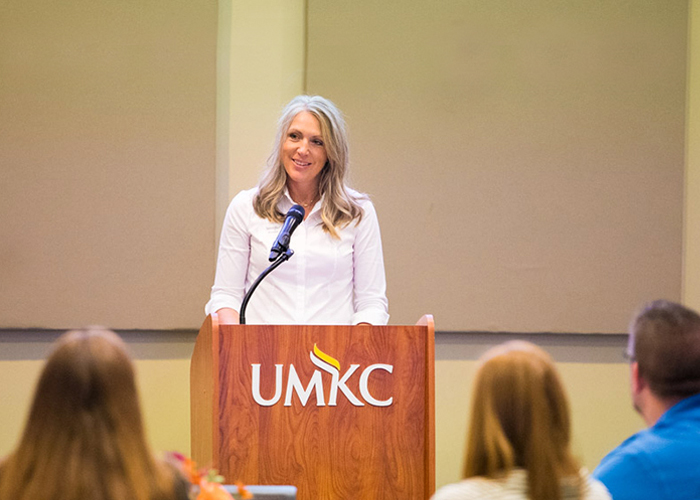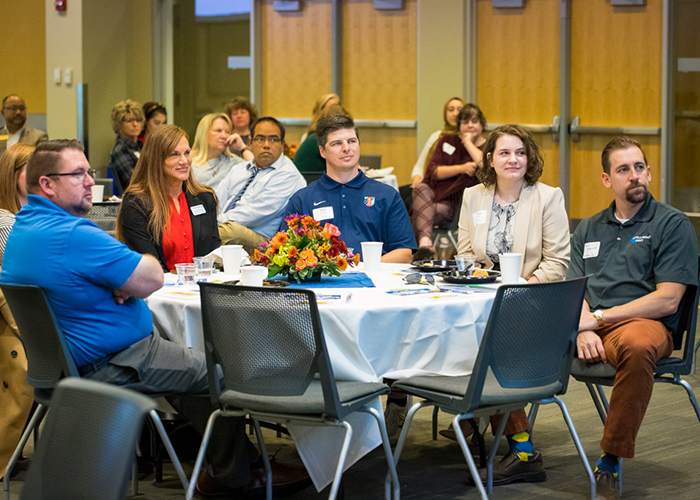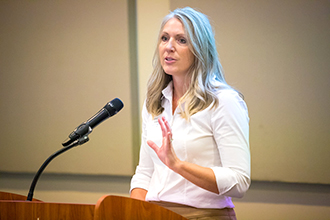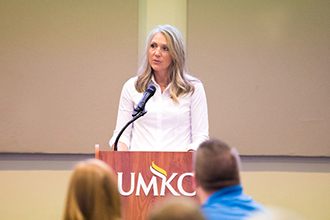homepage | War For Talent Drives Training Needs at T-Mobile And Other Companies
October 26, 2022
October 26, 2022

UMKC TalentLink recently hosted a Community Launch with featured speaker Jennifer Schnack, Vice President of Employee Talent, Development & Experience at T-Mobile. Schnack emphasized the importance of talent development and training to optimize workforces. She shared excerpts from her remarks below for those unable to attend the event.
“TalentLink and their commitment to bringing transformative solutions to the table while supporting our community through impactful engagement is near and dear to my heart. Those are key focus areas of our Talent Development strategy and Employee Experience focus at T-Mobile,” Schnack said.
To attract, retain and grow top talent, career development and learning needs are top of mind for T-Mobile’s leaders and employees. The company prioritizes “providing them with the skills to evolve their career, advance their expertise, and deepen their commitment to personal and professional growth,” Schnack said.

One of the company’s core values, We Won’t Stop, underscores that commitment during a unique time for employers and talent. Schnack elaborates, “We Won’t Stop demands that we are relentless, striving, and never complacent. We’re challenging each other to do better, to be better, and push forward to create a shared future that really matters.”
The focus on developing employees through learning to foster individual and company growth isn’t limited to major employers such as T-Mobile.
Schnack provided perspective on the “unique time” where the war for talent is “reshaping the employment landscape and redefining the dynamic between employee and employer.”
52% of chief human resource officers believe the shortage of critical talent is the top trend impacting future organizations, according to a 2022 Gartner report. Accenture’s Care To Do Better Report indicates that 78% of workers strongly believe their employer is responsible for helping them become net better off.
Essentially, “employers need talent that is future ready from a skills perspective, and employees are looking to employers to help them get there,” Schnack said. “If employers don’t show up in this space, they are likely to not meet employees’ expectations of experience and will not remain competitive within this shifting job market.”
These factors have played a central role in the disruption of hiring patterns and the mobility of workers. Companies across all industries are in an atypical space. “Employers are paying far more to attract talent than they have in years past. And our talent knows it,” Schnack said.
Both employees who stay put and job seekers aiming for other opportunities have higher expectations. From Schnack’s perspective, this dynamic is “forcing some companies to start making the best investment they can, into their people. Longer-term investment needs to be made on optimizing the current workforce and their skills.” Skills-based training is an immediate way to strengthen current talent. Schnack said, “Investing in your employees today helps them grow, be more successful, and increases their value to your company and your communities.”
How do you optimize your workforce to be future ready? Schnack offers three suggestions.



Put your employees first. They want more, they are probably telling you that. And if not, then chances are they need it even more. Take the time to listen to their needs, prioritize their development, and continue to elevate their experience. Create a culture and space to allow for learning agility, personal discovery, and growth to truly thrive.
Create a plan for your future so that you may prioritize the skills needed to get you there. Take the time to build a strategic blueprint for your business and a workforce plan to support it. Once you know where you are going, it is about analyzing where the gaps are between the skills needed to uplevel your organization, and the skills that exist within your workforce as it sits today.
Work the plan! Start narrowing the gap and do not let up on the gas. This type of investment is one that can often be seen as backburner, especially when the regular operational functions of your business may be surging. This is the time to double down on your plan and your people more than ever.
Whether applying this approach at T-Mobile or a smaller company, the tenets remain the same to build and retain a talented workforce. Schnack said, “We want employees to feel appreciated, understood, and valuable – because they are.”
TalentLink is positioned to help established and emerging businesses with an array of training and development courses. Employees who build skills and grow professionally can help a business remain stable in a topsy-turvy job market and uncertain economy. A skilled and committed workforce may also help companies stay competitive. Companies investing in their employees demonstrate commitment that attracts and retains top talent.
Connect with TalentLink’s team about your talent development and training needs. We train small and large groups through affordable solutions – virtual, in person, and onsite at your business with flexible options available. We ‘re ready to listen, discuss, and formulate a plan that works for you.